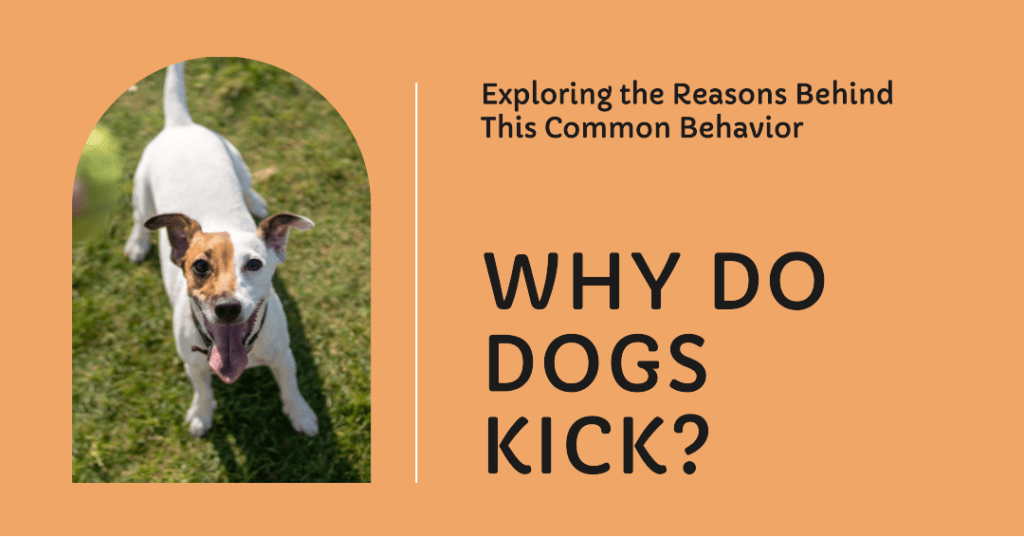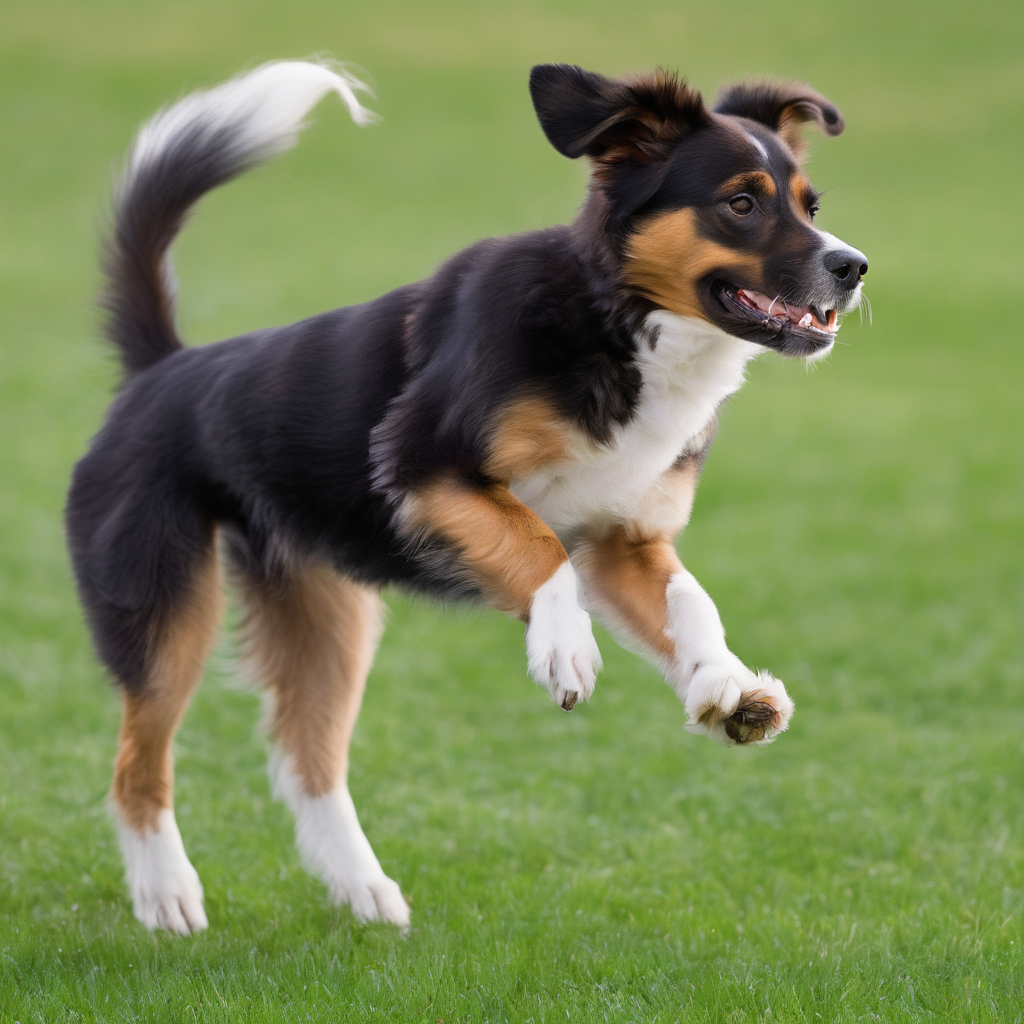Do you ever notice your dog kicking his back legs randomly? Ok, you are not alone. But Why Does My Dog Kick His Back Legs Randomly? This kicking behavior can be concerning for dog owners, as most of us are used to our pups kicking their legs when they’re excited. However, the random kicking of the back legs can be a sign of something more serious.


Why Does My Dog Kick His Back Legs Randomly
There are several potential reasons why your dog may be kicking his back legs. The most common reason is that your pup is trying to scratch an itch, such as an irritated scent gland in the back of their legs. Another possible cause is nerve damage or muscle spasms, or if your dog is older or senior, they may have degenerative joint disease. Or your pup may be trying to kick after they poop as a way to release any excess energy.
It is important to notice your dog kicking his back legs and keep your dog healthy by taking him to the vet if this behavior is occurring often.
Common Reasons Dogs Kick
Some potential causes of Why Does My Dog Kick His Back Legs Randomly include:
1. Playfulness: Dogs may kick their back legs during play, especially when playing with other dogs or with their owners.
2. Itching: Dogs may kick their back legs to scratch an itch or alleviate discomfort on their skin or other areas of their body.
3. Fear or anxiety: Dogs may kick their back legs as a response to feeling fearful or anxious. This can happen in response to loud noises, unfamiliar environments, or other stressful situations.
4. Medical issues: Some medical conditions, such as muscle weakness or nerve damage, can cause dogs to exhibit kicking behavior. It's important to consult with a veterinarian if you suspect any medical issues.
If My Dog Is Kicking? Is It Normal
It is important to understand the behavior of a dog kicking their back legs. Is it normal? Despite the strange behavior, it is a quite common occurrence for dogs. It can be caused by a variety of reasons, ranging from excitement to medical issues.
The behavior is quite noticeable, as the dog will kick their hind legs and sometimes the front. It looks like they are trying to scratch their behind or make a kicking motion. It is also possible to see them kicking up dirt or pawing at the ground. The behavior can be seen in both puppies and senior dogs.
What Does It Look Like When Dogs Kick Their Legs?
When a dog kicks their legs, it can look different depending on the context. If a dog is lying down and kicking its legs while sleeping, it may be engaged in a dream-induced running or chasing motion. This often elicits adorable movements that resemble a playful trot.
When a dog is awake and kicking its legs, it may be a response to being scratched or petted in a particular spot that is causing a pleasurable sensation, such as the belly or behind the ears. In these instances, the dog may kick its legs as a reflexive response to the enjoyable feeling.
Additionally, dogs may kick their legs when they are trying to get comfortable in their bed or when they are performing their natural grooming behaviors, such as scratching or pawing at their fur. Overall, when a dog kicks its legs, it can indicate various emotions and behaviors, from playful dreaming to positive sensory stimulation to self-care and comfort-seeking actions.
When a dog engages in rear leg kicking, you will see their hind legs move in a kicking motion, as if they are trying to move something or dig at it with their back paws. This behavior typically occurs after the dog has pooped, and you may also notice your dog kicking their feet or back legs when they are excited or trying to communicate with other dogs, such as when an alpha dog is protecting its companion. The dog may kick out their back legs randomly, or they may kick them in a synchronized manner.
Signs of Rear Leg Kicking
Having discussed the general behavior of a dog kicking their back legs, it's time to delve into the signs and indicators that this behavior could mean something more than just a simple gesture. Kicking their back legs is a behavior that can present itself in different ways, depending on the underlying cause.
If you notice your dog kicking their back legs, it could be due to a few different conditions. They may be experiencing muscle spasms or nerve damage, or they may be suffering from degenerative joint disease. In some cases, dogs may even be kicking their back legs after they poop in an attempt to kick out their back paws.
Possible Causes – Why Does My Dog Kick His Back Legs Randomly


Excitement, discomfort, and medical conditions are possible causes of a dog kicking their back legs. It may startle dog owners to see their pup kick out their back legs randomly, but there are several common explanations for this kicking behavior.
Excitement
Excitement is one of the most common reasons a dog may kick its back legs. When a canine experiences excitement, they may often kick their back legs in a sign of joy. Whether it is running around with a toy or playing with another pup, the dog kicks his back legs randomly in a sign of happiness. Even when a canine is not playing, they may still kick their legs out of excitement. For instance, when a dog sees its owner or when they are given a treat, it may kick their back legs as a form of excitement.
Discomfort
Discomfort can cause dogs to kick their back legs; this could be due to nerve damage, muscle spasms, or even degenerative joint disease. Additionally, when a dog kicks its back legs after pooping, it's likely due to one of its scent glands being located in the area. It's possible for this behavior to happen to any dog, and could be a reaction to excitement, discomfort, or medical conditions.
Medical Conditions
The medical conditions that can cause a dog to kick their back legs are varied and complex. From nerve damage to muscle spasms, there are a variety of things that can cause a dog to kick their hind legs. In some cases, degenerative joint disease or gland issues may be the cause of a dog's kick after they poop.
If you've noticed your dog kicking their back legs, it is important to take them to the vet for a check-up. A vet can rule out any medical conditions that may be causing the kicking behavior.
How to Help Your Dog Kicking Behavior
Reduce Stress
Reduce Stress – Taking your dog for walks, playing with toys, and providing mental stimulation can help kick out stress. It’s important to provide a safe and comfortable environment for your pup. If you notice your dog kicking his back legs randomly, it may be a sign of stress.
Provide Exercise
Provide Exercise – Exercise is essential to a dog's physical and mental health. Taking your dog for walks, playing fetch, or playing with toys are all great ways to get your dog to kick up some dirt and get moving.
If you notice your dog kicking, it's best to take them to the vet to rule out any serious complications.
Schedule a Vet Appointment
Unusual kicking behavior in your dog can be a sign of something serious. Scheduling a vet appointment will help you determine the root cause of such behavior. Your vet will examine your dog for any physical issues, such as muscle spasms, nerve damage, or degenerative joint disease. They will also look for any signs of scent glands in the back legs that may be causing your dog to kick after they poop.
It's important to take note of when your dog is exhibiting this behavior and to include this information when you visit the vet. If your dog is kicking their legs in response to certain triggers, such as when they are eating, sleeping, or experiencing excitement, your vet will have a better understanding of what's causing the problem.
Tips for Preventing Dogs kick their hind legs
Limit Stimuli, Creating a Positive Environment, and Socialization are key elements in the prevention of dog-kicking behavior.
Limit Stimuli
As we delve further into how to help your dog, it is imperative to understand the importance of limiting stimuli. It is not uncommon for a dog to randomly kick its back legs, and it is important to be aware of this behavior and what causes it. Kicking of the back legs can be caused by several things, such as nerve damage, muscle spasms, degenerative joint disease, or even excitement.
If you notice your dog kicking their back legs, it is best to contact your vet to ensure it is not due to any serious medical conditions.
Create a Positive Environment
Transitioning to prevention, and creating a positive environment for your dog is key to ensuring their physical and mental health. It's up to you, the owner, to provide an enriched, low-stress lifestyle for your pup. Providing them with ample exercise, playtime, and socialization opportunities can help them learn how to better cope with situations that may otherwise cause them to be uneasy.
One way to ensure a positive environment is to limit the stimuli coming from both the outside environment and the presence of other animals. If you notice your dog is becoming easily overstimulated, take them to a more secluded area or remove them from the situation altogether.
Socialization
Another important prevention tip is socialization. Your dog needs to be socialized so they are comfortable around other people and animals. This will help to prevent them from feeling the need to kick their legs randomly as a form of protection or defense. It is a good idea to take your pup to the dog park or puppy classes, or even just have friends and family come over.
This will help them get used to different types of people and animals and will help to avoid kicking their back legs when they encounter something unknown.
When to Consult a Professional
When the behavior is persistent and the dog seems uncomfortable, aggression may be the cause. Owners must be aware of the signs of aggression such as growling, snapping, and kicking.
When the Behavior Is Persistent
This behavior may be a sign of underlying issues, so it's essential to observe your dog and assess the situation. When it comes to persistent kicking, there are a few signs that indicate it is time to consult a professional.
When the Dog Seems Uncomfortable
The sudden, unpredictable kicks from a dog's back legs can be alarming, but they can also be indicative of a deeper issue. When the dog seems uncomfortable, it's time to consult a professional who can diagnose and help manage the underlying cause.
Aggression
In particular, when it comes to aggression, it can be difficult to address on your own. If you notice your dog kicking his back legs randomly, this is a clear sign that something is wrong and the behavior is persistent, you should bring your dog to the vet.
Training Solutions
Training solutions for dogs can be broken down into Positive Reinforcement, Redirection Techniques, and Socialization Training.
Positive reinforcement is a great way to encourage desirable behavior in a dog. When they behave in a way you like, reward them with treats, praise, or petting. This teaches them that what they did was good, and will help them remember it in the future.
Redirection techniques can be used when a dog does something undesirable.
Positive Reinforcement
When it comes to positive reinforcement, it is important to note that dogs will often kick their back legs when they are excited. Owners may see their dog kicking their back legs randomly and assume it is a bad behavior. In reality, this can just be a sign of excitement, and it's important to not discourage this behavior. Instead, use positive reinforcement to encourage desired behaviors.
The best way to use positive reinforcement is to reward your dog with treats or praise when they engage in the desired behavior.
Redirection Techniques
As a dog owner, it is important to recognize the signs of a dog kick and the potential causes of it. Redirection techniques can help prevent a dog from engaging in kicking behavior. When a dog begins to kick their back legs, it is important to notice your dog and identify why it is happening.
To prevent kicking behavior, redirection techniques can be effective. For example, if your dog is kicking during play, you can redirect their attention to a toy or engage in a different activity. If your dog is kicking due to itching, regularly grooming and checking for any skin issues can help alleviate discomfort. If your dog is kicking due to fear or anxiety, providing a calm and comforting environment can help reduce their stress levels.
Overall, understanding the potential causes of kicking behavior in dogs and using redirection techniques can help address and prevent this behavior positively and effectively.
Always keep an eye on your dog's behavior and consult with a professional if you have any concerns about their actions.
Socialization Training
Last but not least, it is important to remember that dogs are complex creatures and depending on the situation, socialization training may be necessary. This includes teaching a dog how to interact with other animals, people, and environments.
Socialization training is crucial for a dog's development and can help prevent behavior problems in the future. It is important to expose a dog to a variety of experiences in a positive and controlled manner to ensure they are comfortable and well-adjusted in different situations.
Socialization should start at a young age and continue throughout a dog's life. This can include visits to new places, meeting new people and animals, and exposure to different sounds and sights. Positive reinforcement and rewards can be used to help the dog associate these experiences with positive outcomes.
It is also important to remember that socialization training should be tailored to the individual dog's personality, breed, and past experiences. Some dogs may require more intensive socialization training than others, and it is important to be patient and consistent in the process.
Overall, socialization training is a vital part of a dog's upbringing and can contribute to their overall well-being and happiness. With proper socialization, dogs can develop into confident, well-behaved, and social animals.
Natural Remedies
Natural remedies encompass a variety of practices, such as dietary changes, herbal supplements and massage, to help alleviate health issues. Dietary Changes involve switching up what your pup eats to help improve their overall wellness. This could mean introducing new foods, eliminating certain ingredients, or adding supplements to their diet.
Herbal Supplements are a great way to introduce natural, plant-based remedies into your pup’s health routine. Common supplements include turmeric, spirulina, and chamomile.
Massage is a great way to provide relief for your pup, by targeting muscles and nerve clusters.
Dietary Changes
Dietary changes can help alleviate some causes of a dog's kicking behavior. Owners should notice their dog's kicking behavior and take note of any changes to their dog's diet. This could include adding or eliminating certain foods. Foods that are high in vitamins and minerals, fatty acids, and proteins, are all essential components of a healthy canine diet. Owners should also look into adding supplements like probiotics and omega-3 fatty acids to their dog's daily meals, as these can help maintain a balanced diet.
Herbal Supplements
As an alternative to traditional training solutions, many pet owners are turning to natural remedies to help their furry companions. One popular option is herbal supplements, which can provide a range of benefits to dogs of all ages.
Herbal supplements are designed to support the body's natural healing processes and provide an extra boost of vitality. There are many types of herbs available, each offering different benefits. Some can help with digestive issues, while others may provide pain relief or help to strengthen the immune system.
Herbal supplements are especially beneficial for senior dogs, as they can help to reduce inflammation in their joints and muscles.
Massage
Massage is a powerful form of therapy that can help alleviate pain, increase mobility, reduce stress, and provide comfort for a pup in need. With the right techniques and knowledge, a dog owner can learn to massage their canine companion and offer a soothing massage that will help relax their pup and reduce certain symptoms.
Though massage is a great way to care for a pup, the dog owner should first consult with a vet or professional to ensure they know the correct techniques.
Conclusion–Why Does My Dog Kick His Back Legs Randomly
Dogs are complex creatures, and they communicate in ways that can sometimes be difficult to understand. Understanding why your dog is randomly kicking his back legs can be both challenging and frustrating. It can be caused by a variety of factors, such as muscle spasms, nerve damage, degenerative joint disease, or an alpha dog protecting its territory. To help your pet, it is important to take them to the vet, prevent any underlying medical conditions, and find ways to manage the behavior.
Natural remedies, like adjusting the diet, providing exercise, or using essential oils can also help reduce the kicking. If your dog's condition does not improve, then it is best to consult a professional. By taking the necessary steps to understand why your dog is kicking his back legs, you can help keep your pup healthy and happy.
FAQs – Why Does My Dog Kick His Back Legs Randomly
Why does my dog kick his back legs randomly?
It's very natural to notice your dog kicking his back legs randomly. This behavior is often a reflexive response and can mean a few things, such as muscle spasms or a reaction to an external stimulus.
What are the common reasons for dogs to kick their hind legs?
There are a few possible reasons for a dog to kick his back legs, including muscle spasms, irritation, or during a dreaming state known as Rapid Eye Movement (REM) sleep.
Is it normal for a dog to kick its back legs?
Yes, it is normal for dogs to kick their legs in certain situations, such as during play, during sleep, or even to alleviate an itch or discomfort.
Should I be concerned if my dog is kicking its hind legs frequently?
If you see your dog frequently kicking its back legs, especially excessively or abnormally, it is advisable to consult with a vet. It could be a sign of an underlying issue such as degenerative joint disease, nerve damage, or irritation.
Can older dogs exhibit kicking motion with their back feet?
Yes, older dogs may exhibit kicking motion with their back feet as a result of muscle weakness, joint pain, or neurological changes.
What should I do if I notice my dog kicking his back legs after they poop?
If you noticed that your dog tends to kick after they poop, it's a common behavior known as “scent marking” and is a natural way for dogs to spread their scent and leave a message for other dogs in the area.
Additional Reading





